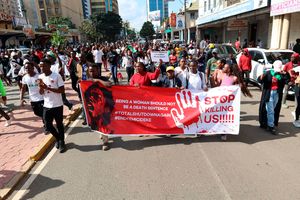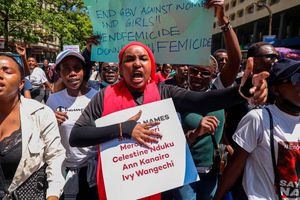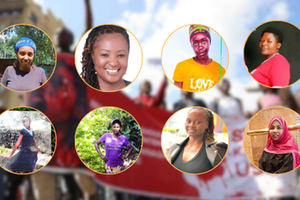
Women in Nairobi take part in a protest dubbed 'Feminist march against femicide' on January 27, 2024, to protest against rising femicide across the country.
At least 129 women have been killed across the country between January and March this year, with most of the murders reported in Busia, West Pokot and Nandi involving female victims.
The month of March recorded the highest number of female deaths with 44, followed by January (43) and February (42).
Last year, 579 female victims of homicide were reported, compared to 534 in the same period in 2023 and 526 in 2022. Men are responsible for 85 percent of the cases and women for 10 percent. The perpetrators of the remaining five percent are unknown. Female-perpetrated murders were particularly high in Nairobi (21 cases) and Central (19 cases).

Members of the Technical Working Group on Gender Based Violence Including Femicide follow proceedings during the stakeholders’ engagement held on April 9, 2025 at the Kenyatta International Convention Centre (KICC).
Of the 47 counties, Kisumu, Kilifi and Nairobi recorded the highest rates of murders with unknown perpetrators.
These findings were part of reports shared by the National Police Service (NPS) and the National Crime Research Centre (NCRC) during a meeting of the Technical Working Group on Gender-Based Violence (GBV) and Femicide. The meeting also marked the last day of consultations with stakeholders working on sexual and gender-based violence (SGBV) and femicide.
To address the crisis, Judy Lamet, the director of Community Policing, Gender and Child Protection at the NPS, called for the establishment and expansion of gender-based violence response units, including gender and child protection units, in all police stations. She also stressed the need for trauma-informed care and crime scene management training for all police officers, especially those on the front line.

Ms Judy Lamet, AIG Director Community Policing at the National Police Service, on April 9, 2025 Kenyatta International Convention Centre (KICC) during the Technical Working Group on Gender-Based Violence Including Femicide stakeholders’ engagement.
To make reporting easier for survivors, the NPS suggested the digitisation of P3 and Post-Rape Care forms for better processing and documentation.
“There should be more investment in infrastructure, both facilities and personnel, to wring out challenges such as ineffective evidence-collection methods in sensitive cases such as rape, where it is crucial to handle all samples very meticulously. This can be done through capacity building,” said Ms Lamet.
In a bid to support survivors, NPS suggested the deployment of police officers to level four hospitals to improve access to medical care.
Amos Omuga, NPS Head of Legal, advocated for the creation of gender justice courts in every county to fast-track GBV and femicide cases. He also proposed the digitisation of GBV reporting mechanisms to enable survivors to inform security agencies swiftly and discreetly.

National Police Service Director of Legal Affairs Amos Omuga, Judy Lamet, the AIG Director Community Policing and Gender, and Collins Songa, the Chief inspector of Police on April 9, 2025 at teh Kenyatta International Convention Centre (KICC) during the Technical Working Group on Gender-Based Violence Including Femicide stakeholders’ engagement.
There is no problem with the laws dealing with GBV cases, “the problem is in the inefficiencies in the enforcement of the policies. The Internal Affairs Unit and the Independent Policing Oversight Authority should investigate all officers accused of negligence in handling these sensitive cases,” he said.
According to NCRC Director Mutuma Ruteere, the Rift Valley topped the list of femicide cases in 2024 with 66 reported cases, followed by Eastern (51) and Western (42). North Eastern had the lowest number, with only eight cases.
Among counties, Nairobi recorded the highest number of femicide cases (19), followed by Kiambu (17), Kilifi (16), and Trans Nzoia (13). In West Pokot and Nandi, all homicide victims were women, while in Busia, seven out of eight homicide victims were female.
“An analysis of the motives behind female killings showed that domestic issues accounted for 50 percent, unknown motives (30 percent), witchcraft allegations (five to 10 percent) and land disputes (five percent). Domestic violence stands out to be the leading cause,” said Dr Ruteere.

National Crime Research Centre (NCRC) Chief Executive Officer Dr Mutuma Ruteere makes his presentation on April 9, 2025 at the Kenyatta International Convention Centre (KICC) during the Technical Working Group on Gender-Based Violence Including Femicide stakeholders’ engagement held.
The report also found that in most cases the perpetrators were known to the victims. Family members were responsible for 60 percent of the murders, intimate partners for 25 percent, strangers for 10 percent and neighbours – often over land disputes – for five percent.
Sharp objects such as knives and pangas were the most commonly used weapons, accounting for 40 percent of femicides. Blunt objects accounted for 30 percent, followed by strangulation (15 percent) and firearms (five percent).
“Tragically, home is the most dangerous place for women. Our data shows that 60 percent of femicide cases happen at home, another 20 percent in public places. Isolated areas account for 15 percent with bars and workplaces accounting for five percent of the cases,” Dr Ruteere added.

Members of the Technical Working Group on Gender Based Violence Including Femicide follow proceedings during the stakeholders’ engagement held on April 9, 2025 at the Kenyatta International Convention Centre (KICC).
To improve response and coordination, the NCRC recommended an integrated data system where all data on SGBV and femicide would be accessible to relevant stakeholders. They also called for nationwide awareness campaigns to address retrogressive cultural practices that perpetuate violence against women and the use of witchcraft accusations to justify killings, particularly those targeting elderly women for land.
“The law must also be fully applied when these cases are reported so that incidents where rape cases are solved solely by Alternative Dispute Resolution mechanisms are done away with,” said Dr Ruteere.
The term of the taskforce ends on April 10, 2025.

Dr Sam Thenya, the vice-chairperson of the Technical Working Group on Gender Based Violence Including Femicide, and Chairperson Dr Nancy Baraza receive a presentation from National Crime Research Centre (NCRC) CEO Dr Mutuma Ruteere (right) on April 9, 2025 at the Kenyatta International Conference Centre (KICC) during the stakeholders’ engagement.
But Chairperson Nancy Baraza said they had asked President William Ruto for an extension to continue gathering views from the public across the country. She made an emotional appeal to parents: “SGBV and femicide is a very big burden to society. Parents, remain connected to your children; and the security sector, continue to be vigilant. These are some of the things we can do as we await the taskforce’s final report.”
If the extension is granted, a gazette notice will be published to inform Kenyans when and where public participation forums will be held, according to Vice Chairperson Sam Thenya.












